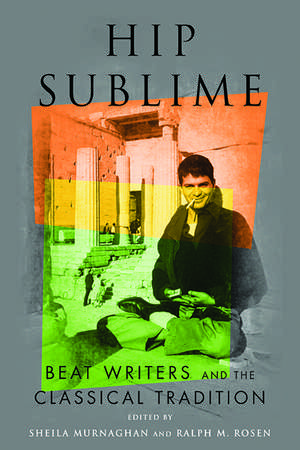Hip Sublime: Beat Writers and the Classical Tradition: Classical Memories/Modern Identitie
Autor Sheila Murnaghan, Ralph M. Rosenen Limba Engleză Paperback – 6 apr 2018
Despite their self-presentation as iconoclasts, the writers of the Beat Generation were deeply engaged with the classical tradition. Many of them were university-trained and highly conscious of their literary forebears, and they frequently incorporated their knowledge of Greco-Roman literature into their own subversive, experimental practice. Seeking to transcend the superficiality, commercialism, and precariousness of life in post–World War II America, the Beat writers found in their classical models both a venerable literary heritage and a discourse of sublimity through which to articulate their desire for purity.
In this volume, a diverse group of contributors explore for the first time the fascinating tensions and paradoxes that arose from interactions between these avant-garde writers and a literary tradition often seen as conservative and culturally hegemonic. With essays that cover the canonical Beat authors—such as Allen Ginsberg, Jack Kerouac, and William Burroughs—along with less well-known figures—including Kenneth Rexroth, Ed Sanders, and Diane di Prima—Hip Sublime: Beat Writers and the Classical Tradition brings long overdue attention to the Beat movement’s formative appropriation of the Greek and Latin classics.
In this volume, a diverse group of contributors explore for the first time the fascinating tensions and paradoxes that arose from interactions between these avant-garde writers and a literary tradition often seen as conservative and culturally hegemonic. With essays that cover the canonical Beat authors—such as Allen Ginsberg, Jack Kerouac, and William Burroughs—along with less well-known figures—including Kenneth Rexroth, Ed Sanders, and Diane di Prima—Hip Sublime: Beat Writers and the Classical Tradition brings long overdue attention to the Beat movement’s formative appropriation of the Greek and Latin classics.
| Toate formatele și edițiile | Preț | Express |
|---|---|---|
| Paperback (1) | 332.82 lei 38-45 zile | |
| Ohio State University Press – 6 apr 2018 | 332.82 lei 38-45 zile | |
| Hardback (1) | 476.83 lei 6-8 săpt. | |
| Ohio State University Press – 6 apr 2018 | 476.83 lei 6-8 săpt. |
Preț: 332.82 lei
Nou
Puncte Express: 499
Preț estimativ în valută:
63.70€ • 66.25$ • 53.38£
63.70€ • 66.25$ • 53.38£
Carte tipărită la comandă
Livrare economică 10-17 martie
Preluare comenzi: 021 569.72.76
Specificații
ISBN-13: 9780814254691
ISBN-10: 0814254691
Greutate: 0.45 kg
Ediția:1
Editura: Ohio State University Press
Colecția Ohio State University Press
Seria Classical Memories/Modern Identitie
ISBN-10: 0814254691
Greutate: 0.45 kg
Ediția:1
Editura: Ohio State University Press
Colecția Ohio State University Press
Seria Classical Memories/Modern Identitie
Recenzii
“Hip Sublime will begin a number of new conversations that can only be healthy for both classicists and twentieth-century specialists. . . . This book throws a bridge across one divide that, as the volume itself makes abundantly clear, should have been spanned long ago.” —Dennis Trout, University of Missouri
“Well-written, well-organized, well-researched, and, most importantly, truly informative, wide-ranging, and groundbreaking in its revisionary understanding of Beat-oriented writings.” —Daniel Morris, Purdue University
Notă biografică
Sheila Murnaghan is the Alfred Reginald Allen Memorial Professor of Greek in the Department of Classical Studies at the University of Pennsylvania. She is the author of Disguise and Recognition in the Odyssey.
Ralph M. Rosen is the Vartan Gregorian Professor of the Humanities in the Department of Classical Studies at the University of Pennsylvania. He is the author of Making Mockery: The Poetics of Ancient Satire.
Ralph M. Rosen is the Vartan Gregorian Professor of the Humanities in the Department of Classical Studies at the University of Pennsylvania. He is the author of Making Mockery: The Poetics of Ancient Satire.
Descriere
Hip Sublime explores the rich interactions between American “Beat” writers of the 1940s–60s and the Greco-Roman tradition.








